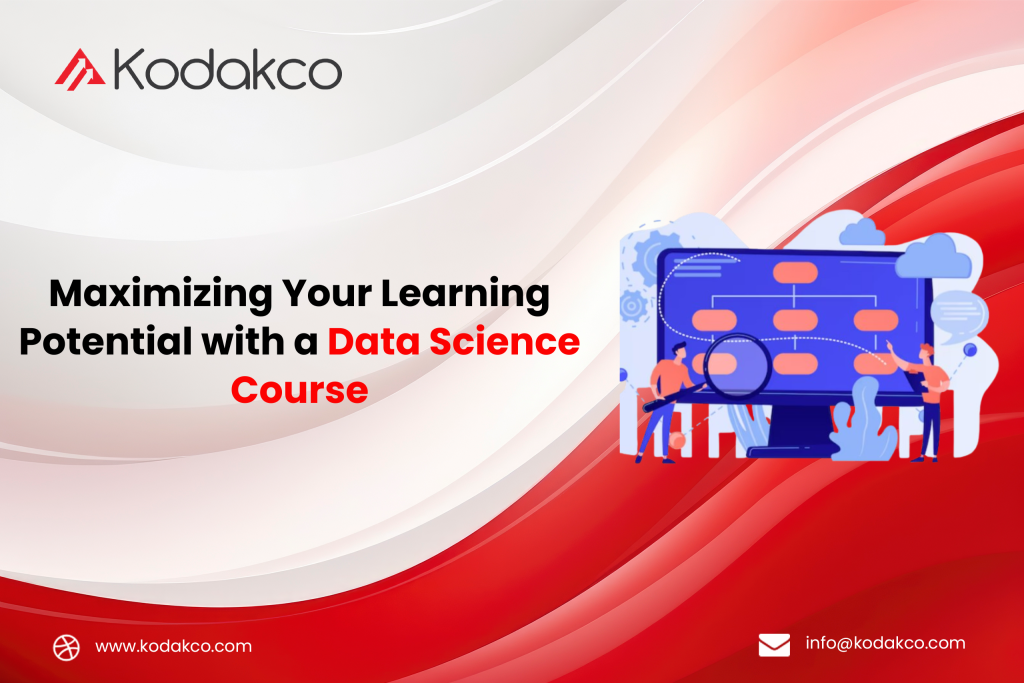Data science is a booming sector in the IT field. The increase in demand for modern technology, tools, and apps acts as a powerful resource to meet our industrial requirements. As a result, there is a great demand for data scientists, and data analysts, because the demand can be attributed also to an increase in the need for organizations. Formerly, this is necessary to make data-driven decisions in an ever-competitive market. Companies across various sectors recognize the value of harnessing data to gain insights, improve efficiency, and drive innovation. The Data Science Course has optimized the utility of data in a more organized way.
What is Data Science?
The ability to extract meaningful insights from the data is prevailing for institutions and industries. Data Science has served as a mild stone to modern business and innovation. This demand has created a thriving demand in the job market for data scientists, and professionals furthermore it helps to change data into actionable intelligence. Hence, offline courses were once a standard, and the landscape has been shifted, with online courses offering ample benefits that can significantly enhance your learning journey.
Why choose a Data Science course?
With advancements in machine learning, artificial intelligence, and data visualization tools, businesses are now able to process vast amounts of information swiftly and effectively.
1. Flexibility and Convenience:
- Learn at your own pace: You are given the freedom to study according to your convenience, balancing your work and personal commitments.
- Access from anywhere: With an internet connection, you are provided with the course materials and can contact your instructors from any location making it great and ideal for professionals and students.
- Diverse learning facilities: Choose from a wide form of courses, and formats (videos, quizzes, projects) that will suit your style.
2. Cost-Effective and Accessible:
- Affordability: Firstly, online courses come with an affordability with comparatively lower tuition fees than offline programs.
- Reduces Transportation: Save on transportation expenses, accommodation, and other miscellaneous expenses.
- Global Reach: Get access to top-tier educational institutes and experts around the world without any constraints.
3. Interactive Learning Experience:
- Engaging Content: Moreover, online courses also offer interactive elements like quizzes, consequently enhancing overall learning.
- Peer Collaboration: Engage with your fellow peer learners from different backgrounds, and share their knowledge and networking opportunities.
Eligibility Criteria of Data Science Course
To join a Data Science course you need an educational background in statistics, computer science, and maths. However, strong analytical skills with a passion for learning data science can be considered. Proficiency in programming languages like Python or R and a solid understanding of statistical concepts and machine learning algorithms do play a dominant role. Additionally, the ability to convey data through visualization is more valuable. Soft skills such as problem-solving, teamwork, and critical thinking are also essential.
Maximizing the Potential of Data Science course through Kodakco
Kodakco is a technology consulting company with branches in Hyderabad and San Francisco. Additionally, we provide training for individuals in the fields of medicine, Six Sigma, SAP, data science, and so on. Furthermore, our focus is on our customer’s needs we always strive to bring value to the relationship. In addition, our program empowers individuals by providing them with date training and offering solutions to the clients to expand their enterprise. Indeed, Python is one of the valuable skills needed for a Data Science career moreover there is great demand for these experts in this IT field this training also offers Data science with Python.
Pros of Kodakco Data Science Course
This Data Science Training offers a structured comprehensive approach to uplift your learning skills in this field. Further, here are some features of the Kodakco course

Comprehensive Curriculum
- In-depth coverage: This course dives into the core data science concepts that include statistics, machine learning, data analytics, and data mining.
- Practical Focus: Emphasis is given on real-based projects and case studies to apply theoretical knowledge.
- Industry-relevant skills: Curriculum aligned with the industry’s latest trends and job requirements.
Expert Faculty
- Experienced Instructors: Taught by industry professionals with incredible Data Science Experience.
- Mentorship: Therefore, access to expert guidance and support is provided throughout the course.
- Industry Insights: Gain valuable exposure to real-world data challenges.
Hands-on Learning:
- Practical Projects: Specifically, work on real-time data sets and industry-based projects.
- Industry-specific case studies: Apply these techniques to solve business problems.
- Internship Opportunities: Gain practical experience through internships with industry partners.
Career Support:
- Job Placement assistance: Dedicated placement cell to help the students to secure different data roles.
- Resume building and interview preparation: Firstly, they guide crafting a resume and providing effective interviews.
- Alumni Network: Connect with the vast network of data science professionals.
Additional Benefits
- Gold Membership: Access to wide resources, webinars, and master classes
- Certification: Gain a global data analyst certificate, indeed a reorganization to enhance future career opportunities.
Future Scope of Data Science
The future of Data Science is bright with many opportunities in various fields like AI, Health Care, Finance, and so on. As technology advances the role of Data Scientist will be even more crucial in shaping our world.
- AI and ML: Data Science acts as a driving advancement in AI and ML
- Healthcare: Data Science can help in healthcare centers by improving diagnosis, personalized treatment, and drug discovery.
- Finance: Detecting fraud, assessing risk, and deducting fraud in finance sectors.
- Marketing: Predicting consumer behavior, personalizing campaigns, and improving consumer segmentation.
- Public Policy: Helps to improve public services.
Conclusion
By enrolling in the Data Science Courses offered at Kodacko, you can transform the learning journey with the extensive knowledge, skills, and network needed to survive in the Data Science domain. Furthermore, by choosing the right course and engaging fully with dedication, henceforth maximize my potential and, consequently, this paves the way for a successful career in this dynamic field.
FAQs
Ans: Match your data skills (programming, machine learning, etc…) to roles like Data analyst, scientist, or engineer therefore to your interest.
Ans: A master’s degree does provide a strong foundation however, it is not mandatory. Moreover, certification with practical exposure, demonstrated through real-time projects and portfolios is sufficient for job seekers.
Ans: Attend industry events, join data science communities, participate in real-time projects, and leverage platforms like LinkedIn. Ultimately, focus on building genuine relationships and sharing knowledge through these platforms.
Ans: Python followed by SQL and R with Tools like Pandas moreover you can master these skills through these online courses tutorials and real-time projects. Additionally, do practice regularly with various projects to enhance your skills.




Hello, my name is Sumeet, I’m student of digital marketing profs institute in Rohini, Delhi. great work on your website. it’s give me more information for data analytics courses . thank you